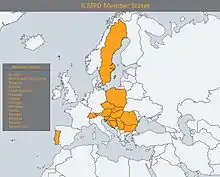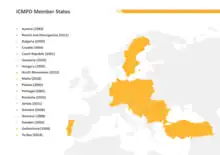International Centre for Migration Policy Development
The International Centre for Migration Policy Development (ICMPD) is an international organisation which makes policy recommendations on migration-related issues to governments and intergovernmental agencies. Founded by Austria and Switzerland as a think tank in 1993,[1] and headquartered in Vienna, Austria.[2] It has changed to directly implementing border control projects, organizing the procurement for border upgrades, is involved in designing curricula for police training programs and in designing surveillance technology. As of May 2023 ICMPD was composed of 20 member states.[3] Current director Michael Spindelegger has been arguing for a more efficient deportation policy.[4] and prescreening.[5]
 | |
| Abbreviation | ICMPD |
|---|---|
| Formation | 1993 |
| Type | International Organisation |
| Headquarters | Vienna |
Director General | Michael Spindelegger (2016–present) |
Staff | 340 |
| Website | icmpd.org |
Financing
As of May 2023, ICMPD did not disclose on its website how it was financed. Figures were only disclosed by the German government upon request by Andrej Hunko, Michel Brandt, Christine Buchholz, other MEPs and the Die Linke. As of 2020 the annual membership fee for Germany was 210,000 euros.[6]: 3
In 2015 its budget was 16.8 million euros, in 2022 it was already 74.5 million, 56 percent of which came from the EU Commission. Also, as an international organization, ICMPD has hardly been subject to financial transparency obligations.[7]
As of 2021, ICMPD has been implementing the "integrated border management programme" together with the Italian Ministry of the Interior, which is financed by the EU Trust Fund for Africa (2021-2027) over € 7.39 billion.[8]
Projects
ICMPD was originally founded as a civilian think tank, and until 2015 it was focused on Eastern Europe and the Balkans.[9][10][11]
Since January 2019, Germany, Poland and the Netherlands have been co-financing the 400,000 euros "RESTART" project to build resettlement (consistently called "reintegration") for Armenian refugees (called "returnees") over a period of 24 months.[6]: 3 Germany has participated in co-financing the construction of a temporary reception center for asylum seekers in Armenia with 158,000 euros.[6]: 3 The project has intended to promote voluntary return, resettlement in the home country by means of benefits in kind in the form of social advice and support, among other things, with the help of finding accommodation, visits to authorities, children’s schooling, medical matters and assistance in job search and vocational training, the long-term improvement of living conditions of the returnees and the prevention of new irregular migration to Germany and Europe and fighting the causes of flight.[6]: 4
Under a so called "migration and diaspora program", ICMPD carried out training on behalf of the German Deutsche Gesellschaft für Internationale Zusammenarbeit (GIZ) on "development-oriented migration" with Albania, Ecuador, Georgia, Ghana, Indonesia, Colombia, Kosovo and Serbia, which it calls "partner countries".[6]: 5 GIZ has also cooperated with ICMPD in prevention and combat of human trafficking in the Western Balkans.[6]: 5
Since 2016 ICMPD has moved its focus to North African countries, like Libya, Tunisia, Morocco and directly implements border control projects, organizes the procurement for border upgrades; it is involved in designing curricula for police training programs and in developing surveillance technology.[9]
In October 2020, the Bavarian Interior Minister Joachim Herrmann (CSU) wrote to then Federal Minister of the Interior Horst Seehofer, he planned to implement a special kind of digital refugee card in Bavaria, which could serve as a debit card, in cooperation with Spindelegger and the ICMPD, which would serve as a model for similar projects in Europe. Seehofer even described the plan as a "lighthouse project".[12] The idea of the debit card carrying other personal data, which could be retrieved by police terminals was developed by Jan Marsalek then CFO of the now defunct wirecard.[13]
In April 2023, NGO "SOS Balkan Route" criticized the involvement of the ICMPD with the refugee camp Lipa.[14] The ICMPD denied the allegations[15] and initiated legal action against the NGO in Mai.[16] The NGO considers this a SLAPP lawsuit.[17]
Purpose
ICMPD cooperates with governments, other international organisations, research institutes and members of civil society in developing policies in migration-related areas, as well organising trainings, etc. to transfer know-how on dealing with migration issues. The purpose of ICMPD is to promote innovative, comprehensive and sustainable migration policies and to function as a service exchange mechanism for governments and organizations. ICMPD provides policy makers and politicians with necessary groundwork to take decisions. Furthermore, ICMPD is present on the ground, with its capacity building activities in various areas of migration management, making migration and mobility of people orderly, safe and regular, including through the implementation of planned and well managed migration policies.
Organisational structure
ICMPD s logo consists of 4 colored arrows pointing outward and 4 white arrows pointing inward.[18]: 13:34 It had around 470 staff members, a mission in Brussels, regional offices in Ankara and Malta, as well as project offices in Africa, Central Asia, the Middle East and South Asia.[19]
Director Generals
- Jonas Widgren (1993–2004)
- Gottfried Zürcher (2004–2009)
- Peter Widermann (2010–2014)
- Gabriela Abado (Acting Director General, 2015)
- Michael Spindelegger (2016–present)
The Office of the Director General consists of Secretariat, Communications, Directorate for Policy, Research and Strategy, Directorate Migration Dialogues and Cooperation, Brussels Mission, People Management and Organisational Development, Corporate Financial Management. The Policy, Research & Strategy (PRS) is headed by Director, and Deputy Director General Lukas Gehrke. Resources and Operations Management (ROM) is headed by Director Angiolo Rolli. Migration Dialogues and Cooperation (MDC) is headed by Director Martijn Pluim. The Brussels Mission, is headed by Ralph Genetzke.
Member states


ICMPD was founded in 1993 by Austria and Switzerland.[20] It was joined in 1995 by Hungary and then in 1998 by Slovenia.[20] The Czech Republic became a member in 2001, followed by Portugal and Sweden in 2002, Bulgaria and Poland in 2003, Croatia in 2004, Slovakia in 2006, Romania in 2010, Bosnia and Herzegovina and Serbia in 2011, and the Republic of North Macedonia in 2012.[20] Malta and Turkey both joined in 2018.[21][22]
In 2020, Federal Republic of Germany joined on the basis of a declaration of international contract law issued by the Federal President. Within the Federal Government, the Federal Ministry of the Interior (Germany) is in charge and the Federal Office for Migration and Refugees has been involved as a business unit authority.[6]: 3
References
- "About ICMPD". www.icmpd.org. ICMPD. Retrieved 2022-05-22.
- Embassy of Slovenia in Vienna – Brief presentation of international organisations in Vienna
- "The Netherlands joins the European migration organisation ICMPD". www.icmpd.org. 11 May 2023. Retrieved 2023-05-24.
- ingrid.steiner (2020-01-31). "Migration nach Europa: Weniger Ankünfte, aber mehr Asylanträge" (in German). Retrieved 2023-06-09.
- Salzburg24 (2020-11-20). "Migration soll laut Spindelegger nach der Corona-Krise steigen" (in German). Retrieved 2023-06-09.
- "Antwort der Bundesregierung auf die Kleine Anfrage der Abgeordneten Andrej Hunko, Michel Brandt, Christine Buchholz, weiterer Abgeordneter und der Fraktion DIE LINKE. – Drucksache 19/19825.Deutscher Beitritt zum International Centre for Migration Policy Development" (PDF). 2020-06-20. Retrieved 2023-05-24.
- "International Centre for Migration Policy Development (ICMPD) Die Migrations-Manager". fragdenstaat.de. 2023-05-19.
- "Integrated Border Management Fund". commission.europa.eu. nd. Retrieved 2023-06-08.
- Naceur, Sofian Philip (2020-07-23). "EU-Flüchtlingspolitik in Tunesien: Fortlaufende Grenzverschiebung". Die Tageszeitung: taz (in German). ISSN 0931-9085. Retrieved 2023-06-08.
- "Balkans.com – The number of false asylum seekers from Serbia in the EU has significantly reduced". Archived from the original on 2012-03-21. Retrieved 2011-09-16.
- "Turkey joins Vienna-based migration policy center". Retrieved 2018-07-03.
- Frag den Staat. "bmi-bezahlkarte3" (in German). Retrieved 2023-06-09.
- "International Centre for Migration Policy Development (ICMPD): Die Migrations-Manager" (in German). 2023-05-19. Retrieved 2023-06-09.
- "So sieht das österreichische Guantanamo in Bosnien aus (FOTOS & VIDEOS): „Sie sperrten uns 4 Tage in der Kälte ein"". OTS.at (in German). Retrieved 2023-07-13.
- red, ORF at/Agenturen (2023-04-11). "Flüchtlingscamp Lipa: Spindeleggers ICMPD weist Vorwürfe zurück". news.ORF.at (in German). Retrieved 2023-07-13.
- red, ORF at/Agenturen (2023-05-09). "Camp Lipa: ICMPD klagt SOS Balkanroute". news.ORF.at (in German). Retrieved 2023-07-13.
- "SOS Balkanroute über SLAPP Klage von ICMPD: „Angriff auf gesamte österreichische Zivilgesellschaft"". OTS.at (in German). Retrieved 2023-07-13.
- "ZDF Magazin Royale vom 19. Mai 2023" (in German). 2023-05-19. Retrieved 2023-06-08.
- ICMPD website – About Us
- "ICMPD website – Member States". 2011-07-26. Archived from the original on 2012-04-02. Retrieved 2011-09-14.
- "Malta becomes the first Central Mediterranean Member State of the International Centre for Migration Policy Development". foreignaffairs.gov.mt. Retrieved 2018-07-12.
- "From Rep. of Turkey Ministry of Foreign Affairs". Republic of Turkey Ministry of Foreign Affairs. Retrieved 2018-07-12.